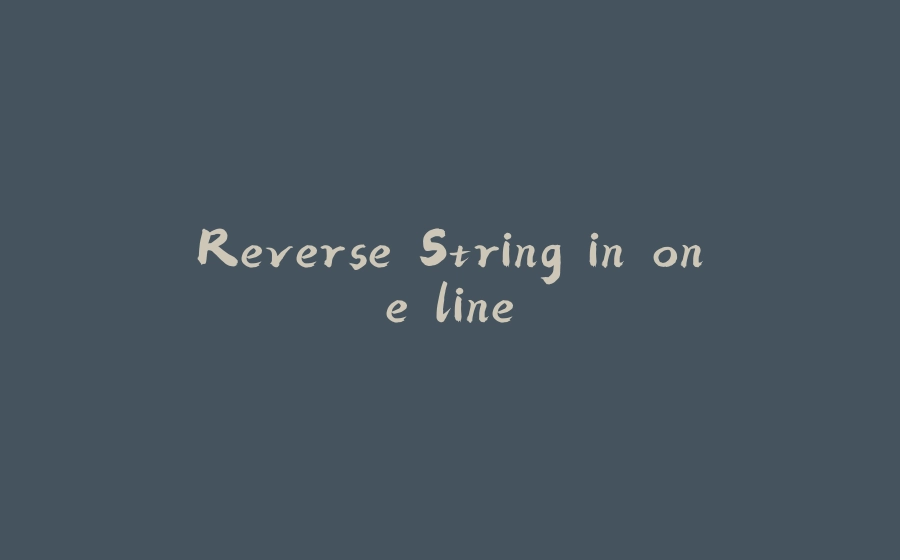Yesterday, while scrolling Twitter I stumbled upon this one:
30 seconds of code @30secondsofcode
reverseString: Reverses a string.
#JavaScript
30secondsofcode.org/js/s/reverse-s… 12:30 PM – 27 Apr 2021
![图片[4]-Reverse String in one line - 拾光赋-拾光赋](https://www.blogs.ink/wp-content/themes/zibll/img/thumbnail-lg.svg)
![图片[5]-Reverse String in one line - 拾光赋-拾光赋](https://www.blogs.ink/wp-content/themes/zibll/img/thumbnail-lg.svg)

At first, I was amazed how much JavaScript has changed since the last time I tried it. Spread operator and useful methods directly on array objects are something that I am missing in Java.
Naturally being a Java dev, as I was looking at JS code I tried to transpile it to Java code. Initial code would look something like this:
public String reverse(String in){
String[] split = in.split("");
Collections.reverse(Arrays.asList(split));
return String.join("", split);
}
Enter fullscreen mode Exit fullscreen mode
This works but this is more than one line. To produce oneliner I started looking at Java Stream API and its methods. While I was aware that all intermediate operations are out of the question for such a task, I started looking at available Collectors.
My search came back empty and I had to resort to implementing custom Collector:
public String reverse(String in){
return Arrays.stream(in.split("")).collect(new Collector<String, List<String>, String>() {
final List<String> helper = new LinkedList<>();
@Override
public Supplier<List<String>> supplier() {
return () -> helper;
}
@Override
public BiConsumer<List<String>, String> accumulator() {
return (strings, s) -> strings.add(0, s);
}
@Override
public BinaryOperator<List<String>> combiner() {
return null;
}
@Override
public Function<List<String>, String> finisher() {
return strings -> String.join("", strings);
}
@Override
public Set<Characteristics> characteristics() {
return new HashSet<>();
}
});
}
Enter fullscreen mode Exit fullscreen mode
There it is! Technically it’s a oneliner. Our supplier method is a simple list, when we add a new item to the list we always do it at the beginning of the list as in the accumulator method. The finisher combines a list into a resulting String. We don’t implement combiner because parallel streams are not ordered and we cannot lose the initial string order.
Of course, this is overkill and I did it just for fun, but I got to admit how powerful the Collector API is.
Do you have another way of writing this method? Write it in the comments! Thanks for reading!



![图片[1]-Reverse String in one line - 拾光赋-拾光赋](https://res.cloudinary.com/practicaldev/image/fetch/s--o0JpC_lt--/c_limit%2Cf_auto%2Cfl_progressive%2Cq_auto%2Cw_880/https://pbs.twimg.com/media/Ez-woTkX0AccEwm.jpg)
![图片[2]-Reverse String in one line - 拾光赋-拾光赋](https://res.cloudinary.com/practicaldev/image/fetch/s--JxTTuVim--/c_limit%2Cf_auto%2Cfl_progressive%2Cq_auto%2Cw_880/https://pbs.twimg.com/profile_images/1202856179971559424/24MUOHhO_normal.png) 30 seconds of code @30secondsofcode
30 seconds of code @30secondsofcode![图片[3]-Reverse String in one line - 拾光赋-拾光赋](https://res.cloudinary.com/practicaldev/image/fetch/s--ir1kO05j--/c_limit%2Cf_auto%2Cfl_progressive%2Cq_auto%2Cw_880/https://dev.to/assets/twitter-f95605061196010f91e64806688390eb1a4dbc9e913682e043eb8b1e06ca484f.svg) reverseString: Reverses a string.
reverseString: Reverses a string.![图片[4]-Reverse String in one line - 拾光赋-拾光赋](https://res.cloudinary.com/practicaldev/image/fetch/s--fFnoeFxk--/c_limit%2Cf_auto%2Cfl_progressive%2Cq_auto%2Cw_880/https://dev.to/assets/twitter-reply-action-238fe0a37991706a6880ed13941c3efd6b371e4aefe288fe8e0db85250708bc4.svg)
![图片[5]-Reverse String in one line - 拾光赋-拾光赋](https://res.cloudinary.com/practicaldev/image/fetch/s--k6dcrOn8--/c_limit%2Cf_auto%2Cfl_progressive%2Cq_auto%2Cw_880/https://dev.to/assets/twitter-retweet-action-632c83532a4e7de573c5c08dbb090ee18b348b13e2793175fea914827bc42046.svg)
























暂无评论内容